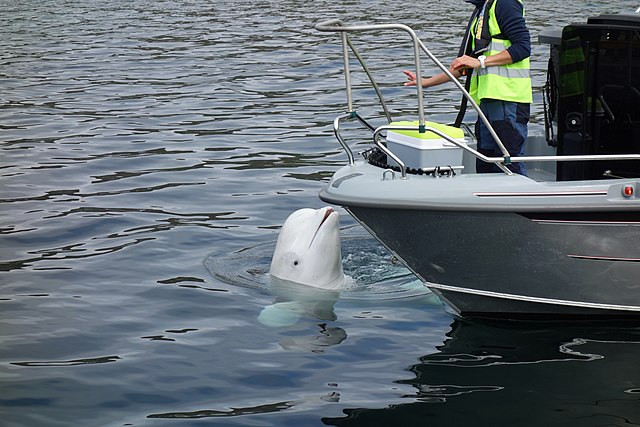The mysterious death of Hvaldimir, the beluga whale once speculated to have been trained as a Russian spy, has taken an unexpected turn as a preliminary autopsy report reveals that the whale did not die from gunshot wounds, contrary to earlier claims. The whale's sudden death, which had stirred both grief and suspicion among animal rights groups, is now being attributed to natural causes, bringing an end to the dramatic allegations of foul play.
Hvaldimir's body was discovered off the coast of Norway in late October, prompting immediate concern from conservation groups. Two prominent organizations, NOAH and OneWhale, were quick to claim that the whale had been shot, citing what they described as "compelling evidence" of bullet wounds on the whale's body. The groups even shared photographic evidence that appeared to show multiple wounds, calling for a thorough investigation to identify those responsible for what they believed to be a deliberate act of violence.
However, Norwegian authorities, after conducting a preliminary autopsy, have refuted these claims. Amund Preede Revheim, head of the North Sea and environment section at the Sør-West police district, stated that the autopsy found no evidence to support the theory that Hvaldimir was shot. "Among other things, an X-ray was taken of the front part of the more than 4-metre-long whale, where the wounds are. Here, nothing has been found to indicate that these injuries stem from gunshots. No projectile has been found either," Revheim confirmed.
The autopsy instead pointed to signs of widespread organ failure and an empty stomach as possible factors in Hvaldimir's demise. Additionally, a 14-inch-long stick was found lodged in the whale's mouth, which may have contributed to its inability to feed. While these findings suggest that Hvaldimir's death was likely due to natural causes, Revheim emphasized that the investigation is ongoing, with a final report expected in the coming weeks.
Hvaldimir first gained international attention in 2019 when he was spotted by Norwegian fishermen wearing a harness with the label "Equipment St. Petersburg." His unusually sociable behavior and the mysterious harness led to speculation that he had been trained by the Russian military as part of a Cold War-era program to use marine animals for reconnaissance and other purposes. The whale quickly became a local celebrity, beloved for his playful interactions with humans.
The initial shock over Hvaldimir's death was compounded by the animal rights groups' allegations of a violent end. Regina Haug, founder of OneWhale, expressed deep sorrow upon seeing the whale's lifeless body, describing him as a "strong, capable, and energetic animal" with a "sweet and cheeky personality." Haug and others were adamant that the injuries visible on the whale's body were the result of a criminal act, leading them to file a report with the Norwegian police and the National Authority for Investigation and Prosecution of Economic and Environmental Crime.
Despite the passionate assertions from these groups, the Norwegian Veterinary Institute, which conducted the autopsy, has remained cautious in its statements. The Institute noted that while the investigation is ongoing, there has been no conclusive evidence to suggest foul play. "We have together with the Directorate of Fisheries of Norway been in contact with the police ahead of the autopsy, and will of course involve them if we uncover anything indicating anything suspicious," the Institute said.
The findings have sparked a reassessment among those involved in Hvaldimir's care. Marine Mind, the nonprofit organization that initially discovered Hvaldimir's body, had previously expressed concerns about the whale's relocation to northern Norway, where he was expected to join other belugas. CEO Sebastian Strand of Marine Mind suggested that some of the visible injuries might have been caused by seabirds, urging caution in drawing conclusions before the autopsy results were finalized. "The only way to know for sure what those injuries were will be the official statement from the veterinary institute that is doing the autopsy," Strand stated.
Hvaldimir's death, though now less mysterious in its cause, remains a poignant event for those who followed his story. The whale, once at the center of espionage rumors, became a symbol of the complex relationship between humans and marine life. As the final autopsy report approaches, it seems increasingly likely that Hvaldimir's story will conclude not with a dramatic act of violence, but rather with a reminder of the fragility of life in the wild.




